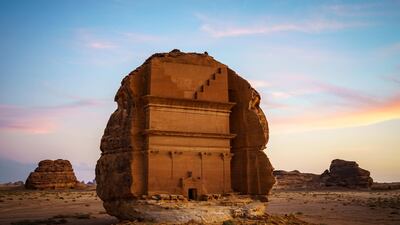Saudi Arabia is wooing foreign investors with potential tourism and hospitality ventures, where demand still outpaces supply, making it an attractive investment destination in a post-pandemic world, according to the kingdom's investment minister.
There will be "prime opportunities" available to investors as the kingdom seeks to "activate" the sector, with plans for 500,000 hotel rooms to be built over a decade and with airports forecast to handle 100 million passengers annually by 2030, Khalid Al-Falih, Saudi Arabia's investment minister, said at the Future of Hospitality summit on Tuesday.
"What makes Saudi Arabia unique as we come post-Covid is no matter how fast global tourism and travel grows, Saudi Arabia has uncapped and unleashed demand and we're going to be under-supplied with assets, hotel rooms, infrastructure, airports, logistics," he said. "There are going to be projects and opportunities and they are all going to be offered to the private sector."
The focus on developing the tourism sector is a major part of Crown Prince Mohammed bin Salman's Vision 2030 reform that seeks to diversify the kingdom's economy and reduce its reliance on oil. Last month, Saudi Arabia's Tourism Development Fund signed an agreement with two of the country's major lenders, Riyad Bank and Banque Saudi Fransi, to finance tourism projects worth up to 160 billion riyals ($43bn) in the kingdom.
Saudi Arabia, which opened its doors to foreign tourists in September 2019 when it introduced new visas, aims for the sector to account for 10 per cent of gross domestic product by 2030.
Mr Al-Falih reiterated Saudi Arabia's target to host 100 million visitors by 2030, up from 20 million in 2019.
The ministry of investment is working to familiarise international investors with Saudi Arabia's business landscape and regulatory environment, particularly in non-oil sectors, he said.
"We have a fantastic record from the Aramco investments to petrochemicals, so investors in that sector — oil and gas and petrochemicals — are very comfortable with the kingdom, but I think it's fair to say that it's less so with sectors like tourism or ICT," the minister said.
"What we're trying to do is lay out the business case, explain the demand in the market that's addressable within these sectors as well as the regulatory environment," he said.
Foreign investors who do not have exposure in Saudi Arabia may see perceived risk that their local counterparts do not, he said.
"We have to respect that and put ourselves in their shoes and look at our regulatory environment and, whether those risks are real or perceived, we have to acknowledge them and try to mitigate them in their eyes by providing stability and changing regulations," he said.
The country is sharing 27 laws and regulations with the private sector for consultation before it enacts them, he said. Saudi Arabia is also planning to introduce economic zones to address the needs of investors in terms of tax regimes, international arbitration and legal framework, though these have yet to be finalised, he said.
The kingdom is also intent on leveling the playing field for both local and international investors, he said.
"Reform is the name of the game," Mr Al-Falih said.


